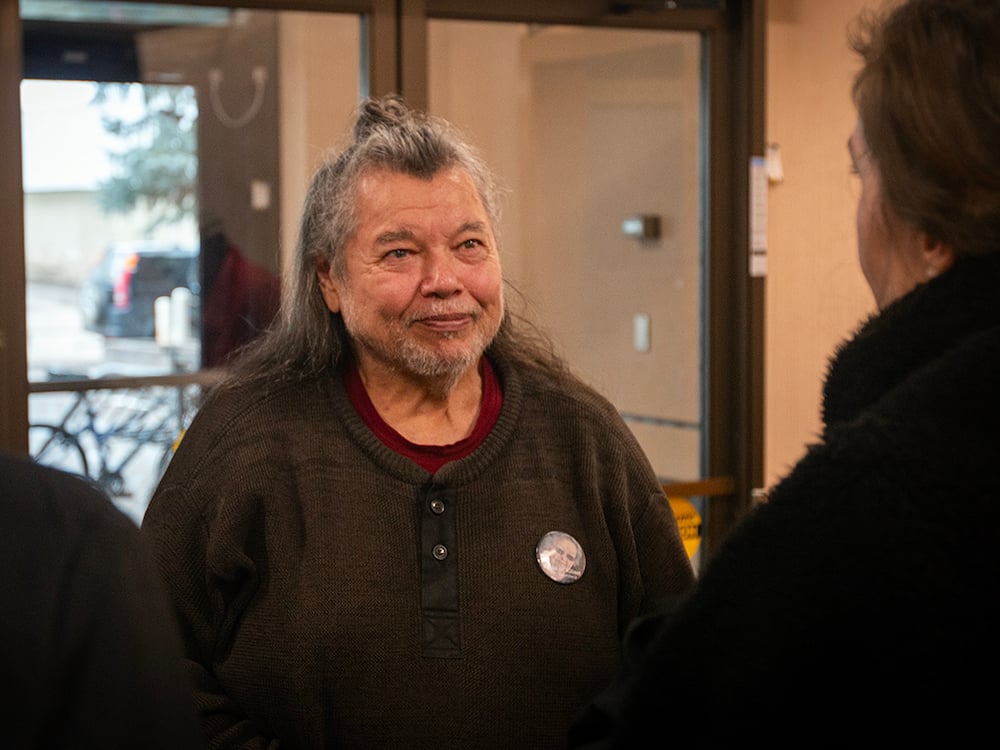The B.C. Supreme Court has ruled that a traditional Wet’suwet’en trespass law cannot “coexist” with the injunction order issued to Coastal GasLink in response to pipeline protests from the nation’s hereditary leadership.
As a result, Chief Dsta’hyl, a Wing Chief of the Likhts’amisyu Clan of the Wet’suwet’en Nation who also goes by Adam Gagnon, was found guilty of criminal contempt in a Smithers courtroom on Tuesday morning. To be found guilty of contempt of court, the prosecution needs to establish that a person is aware of a court order and violated it intentionally. To meet the threshold for criminal contempt, the violations must be public in nature.
In making the decision, Justice Michael Tammen rejected a defence argument that could have set precedent in cases involving conflicts between Canadian court orders and Indigenous legal orders.
The defence asked Tammen to consider a section of the Criminal Code that would allow him to recognize a new defence that Dsta’hyl was acting in accordance with a coexisting Indigenous legal order.
The defence argued that “subjugating Indigenous law to colonial law, when they both form part of the law of the land in Canada, brings the administration of justice into scorn, precisely the consequence that criminal contempt proceedings are meant to punish.”
But Tammen determined that, rather than “harmonizing colonial law and Indigenous law,” allowing the novel defence would recognize “an imprecisely defined law of trespass to the exclusion of the Canadian law of contempt.”
“The two legal orders cannot comfortably coexist in the circumstances,” Tammen ruled. “The proposed defence advocates application of the Wet’suwet’en law of trespass to effectively render nugatory a valid order made by this court.”
He agreed with BC Prosecution Service lawyers that the argument should have been made under Section 35 of the Constitution Act, which recognizes Indigenous rights. But he added that it would have been unlikely to succeed “absent a proven claim of Aboriginal title to the land in question.”
Wet’suwet’en hereditary leaders have opposed pipeline construction through their traditional territory since before the Coastal GasLink pipeline project was first proposed. In December 2018, the B.C. Supreme Court issued an interim injunction to the company, which prohibited anyone from blocking pipeline access roads or work sites. A year later, on Dec. 31, 2019, the court granted a permanent injunction for the duration of the project.
Days later, Wet’suwet’en hereditary leaders issued an eviction order to Coastal GasLink and closed the remote Morice Forest Service Road, which provides access to the pipeline route. The standoff, which lasted more than a month, resulted in a five-day police action in February 2020 that led to 28 arrests.
Coastal GasLink, which announced mechanical completion of the 670-kilometre pipeline through northern B.C. in November, has pointed to impact benefit agreements signed with five of six Wet’suwet’en band councils as evidence of support for the project.
But the nation’s traditional government has maintained that hereditary leaders have jurisdiction over the territory beyond reserve lands, something they say was affirmed in the Delgamuukw court decision.
While the 1997 Supreme Court of Canada decision acknowledged on appeal that the Wet’suwet’en had never ceded title to their traditional territory, it encouraged B.C. and the nation to come to an agreement through negotiation rather than continue through the court system. That never happened.
The Delgamuukw decision was acknowledged by B.C. Supreme Court Justice Marguerite Church in her final injunction decision in 2019. “The Aboriginal title claims of the Wet’suwet’en remain outstanding and have not been resolved either by litigation or negotiation, despite the urging of the Supreme Court of Canada in Delgamuukw,” she determined.
Following the February 2020 arrests, the province, Canada and Wet’suwet’en hereditary leaders signed a memorandum of understanding meant to continue tripartite discussions about land use in Wet’suwet’en territory. The MOU recognized that the nation’s rights and title are “held by Wet’suwet’en Houses under their system of governance.”
More than 75 arrests have been made under the injunction since January 2019. Some arrests did not result in criminal charges. Other arrestees have pled guilty.
In November, Tammen found Sabina Dennis, who is Dakelh, not guilty of criminal contempt for a November 2021 arrest on a bridge on the Morice road, instead determining she intended to play a peacekeeping role as RCMP moved to make arrests.
Last month, Tammen determined there was sufficient evidence to convict three Indigenous land defenders — Sleydo’ Molly Wickham, Shaylynn Sampson and Corey Jocko. They were arrested the day after Dennis and later charged with criminal contempt. Hearings have begun into an application by the defence to stay the charges based on police conduct during the arrests.
Chief Dsta’hyl’s arrest took place in October 2021, after a series of interactions with Coastal GasLink workers and security contractors on the Shea Forest Service Road on Likhts’amisyu Clan territory.
During those interactions, Dsta’hyl and others blocked access to a work camp and “seized and rendered inoperable” multiple pieces of machinery belonging to Coastal GasLink contractors by cutting electrical wires and removing batteries, according to evidence presented during the trial.
When Dsta’hyl was arrested, he had four batteries from heavy machinery in the back of his pickup truck, the judge said.
“There is little dispute concerning the basic facts,” Tammen said, noting that video evidence documenting the incidents was presented during the trial.
“Chief Dsta’hyl, acting as an enforcement officer for the Likhts’amisyu Clan, participated in the decommissioning of a piece of heavy equipment owned by a CGL subcontractor on Oct. 17, 2021. That action consisted of removing the battery from the equipment, an excavator, thus rendering it inoperable.”
Witnesses for the defence included other Likhts’amisyu Chiefs, who described the Wet’suwet’en traditional clan system and its role in governing the traditional territory. Among the Chiefs’ duties is preservation and protection of the traditional territory, or yintah, Tammen said.
Tammen also summarized the Wet’suwet’en law of trespass, something described in detail by defence witnesses, saying permission is required to access territory belonging to a house group “beyond just passing through it.”
“Historically, a trespasser who took bounty from a territory was given one warning, then summarily shot and killed for a second transgression,” Tammen said. “In more recent times, the law of trespass has not been enforced in that manner but retains great importance nonetheless.”
Defence witnesses testified that seizing or disabling heavy equipment was thought to be a “proportionate means of enforcing the law of trespass” meant to force Coastal GasLink into discussions with the Hereditary Chiefs. Tammen said the actions were meant not to disrespect the rule of law, but to uphold Wet’suwet’en law.
“Chief Dsta’hyl said that he was, during the events of Oct. 17 to 26, 2021, enforcing the Wet’suwet’en law of trespass. He knew his actions ran afoul of the injunction but believed he was upholding Wet’suwet’en law at all times,” he said.
“He also said he did not believe his conduct would generate disrespect for the rule of law because he was completely forthright with both the RCMP and CGL security people concerning his actions.”
But Tammen determined that there was “overwhelming” evidence that Dsta’hyl’s intention was to depreciate the court’s authority. He referred to several recorded comments Dsta’hyl had made, which included assertions that “your law doesn’t work on our territory,” that the injunction “doesn’t exist” and was “invalid.”
Dsta’hyl had also referred to the judge who issued the injunction as “Dishonourable Church” and “Injustice Church,” he added.
“It is difficult to conceive of a clearer case of knowledge that one’s conduct would depreciate the authority of the court than this,” Tammen said. “Chief Dsta’hyl’s words show his personal disdain or contempt for the court and its order.”
He noted that Church’s injunction order had considered — and dismissed — some of the same arguments presented during Dsta’hyl’s trial, including those related to Wet’suwet’en law.
“Justice Church referred to Delgamuukw several times in her judgment and noted correctly that the Supreme Court of Canada decision left unresolved the Aboriginal title claims of the Wet’suwet’en,” he said. If the Likhts’amisyu Clan Chiefs were unhappy with the decision, they should have appealed through the courts, he added.
“In conclusion, I decline to give legal effect to the proposed novel excusatory defence. The Crown has proved the case of criminal contempt against Chief Dsta’hyl beyond a reasonable doubt, and I find him guilty of criminal contempt,” Tammen said.
Criminal contempt penalties can include fines or imprisonment. At a March 6 appearance to discuss sentencing dates, the BC Prosecution Service said it intends to ask for up to 90 days incarceration. On March 8, sentencing was set for July 2 and 3, 2024.*
* Story updated on March 6 at 10:57 a.m. and again on March 8 to include new sentencing information. ![]()
Read more: Indigenous, Energy, Rights + Justice

















Tyee Commenting Guidelines
Comments that violate guidelines risk being deleted, and violations may result in a temporary or permanent user ban. Maintain the spirit of good conversation to stay in the discussion and be patient with moderators. Comments are reviewed regularly but not in real time.
Do:
Do not: